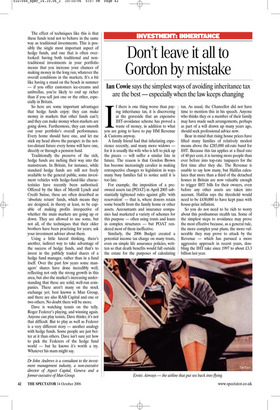The effect of techniques like this is that these funds
tend not to behave in the same way as traditional investments. This is possibly the single most important aspect of hedge funds, and one that is often overlooked: having both traditional and nontraditional investments in your portfolio means that you increase your chances of making money in the long run, whatever the overall conditions in the markets. It’s a bit like having a stand on the beach in summer — if you offer customers ice-creams and umbrellas, you’re likely to end up richer than if you sell just one or the other, especially in Britain.
So here are some important advantages that hedge funds enjoy: they can make money in markets that other funds can’t; and they can make money when markets are going down. Furthermore, they can smooth out your portfolio’s overall performance. Every home should have one, and let me stick my head above the parapet: in the nottoo-distant future every home will have one, directly or through a pension fund.
Traditionally the preserve of the rich, hedge funds are inching their way into the mainstream. In Britain, for instance, while standard hedge funds are still not freely available to the general public, some investment vehicles with hedge-fund-like characteristics have recently been authorised. Offered by the likes of Merrill Lynch and Credit Suisse, these are often described as ‘absolute return’ funds, which means they are designed, in theory at least, to be capable of making profits irrespective of whether the main markets are going up or down. They are allowed to use some, but not all, of the techniques that their older brothers have been practising for years; ask your investment adviser about them.
Using a little lateral thinking, there’s another, indirect way to take advantage of the success of hedge funds, and that’s to invest in the publicly traded shares of a hedge fund manager, rather than in a fund itself. Over the past few years some managers’ shares have done incredibly well, reflecting not only the strong growth in this area, but also the market’s increasing understanding that these are solid, well-run companies. There aren’t many on the stock exchange yet; best known is Man Group, and there are also RAB Capital and one or two others. No doubt there will be more.
Dave is watching tennis on the telly. Roger Federer’s playing, and winning again. Anyone can play tennis, Dave thinks; it’s not that difficult. But to play as well as Federer is a very different story — another analogy with hedge funds. Some people are just better at it than others. Dave isn’t sure yet how to pick the Federers of the hedge fund world — but he knows it’s worth a try. Whatever his mam might say.


































































































 Previous page
Previous page